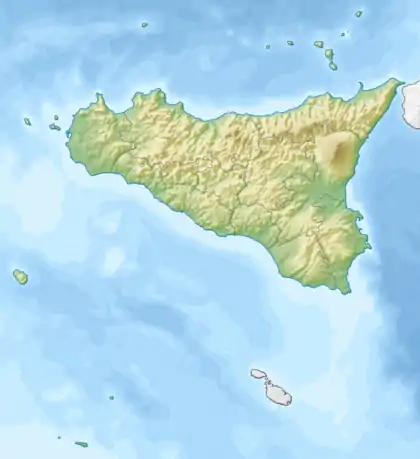SS Chesterfield (1913)
SS Chesterfield was a cargo vessel built for the Great Central Railway in 1913.[2]
| History | |
|---|---|
| United Kingdom | |
| Name | SS Chesterfield |
| Operator | Great Central Railway |
| Port of registry | |
| Builder | Swan, Hunter & Wigham Richardson Ltd,[1] Neptune Yard, Low Walker |
| Yard number | 924 |
| Launched | 30 October 1913 |
| Out of service | 18 May 1918 |
| Fate | Torpedoed and sunk |
| General characteristics | |
| Tonnage | 1,013 gross register tons (GRT) |
| Length | 250 feet (76 m) |
| Beam | 34.2 feet (10.4 m) |
| Depth | 16 feet (4.9 m) |
History
The ship was built by Swan Hunter and launched in 1913. She was the first of an order of two ships from Swan Hunter, the other being Macclesfield. She was deployed on the Grimsby to Rotterdam service.[3]
She was requisitioned by the British Admiralty in October 1914 for use as a fleet messenger and renamed HMS Chesterfield. On 18 May 1918 she was torpedoed and sunk in the Mediterranean Sea at 36°17′N 15°13′E, 42 nautical miles (78 km) northeast by east of Malta, by the Imperial German Navy submarine SM UC-52 with the loss of four of her crew.[4]

Map of Sicily. Approximate position of wreck of the Chesterfield
References
- "SS Chesterfield (1913)". www.tynebuiltships.co.uk. Retrieved 8 May 2017.
- Duckworth, Christian Leslie Dyce; Langmuir, Graham Easton (1968). Railway and other Steamers. Prescot, Lancashire: T. Stephenson and Sons.
- "Trial Trip of the Macclesfield". Newcastle Journal. England. 23 June 1914. Retrieved 10 November 2015 – via British Newspaper Archive.
- "Chesterfield". Uboat.net. Retrieved 18 December 2012.
This article is issued from Wikipedia. The text is licensed under Creative Commons - Attribution - Sharealike. Additional terms may apply for the media files.